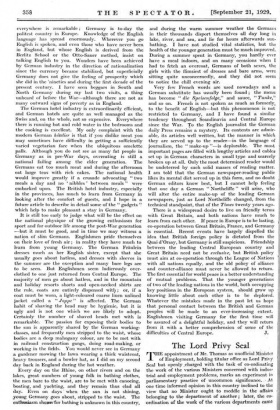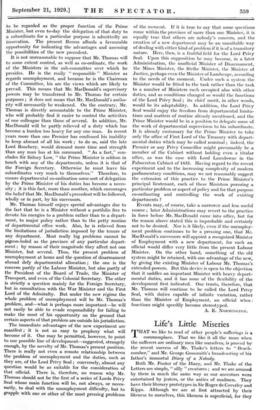The Lord Privy Seal
THE appointment of Mr. Thomas as unofficial Minister of Employment, holding titular office as Lord Privy Seal- but openly ,charged with the task of co-ordinating the work of the various Ministers concerned with indus- trial and employment problems, marks an experiment in parliamentary practice of uncommon significance. At one time informed opinion in this country inclined to-the view that no Minister ought to meddle in the affairs belonging to the department of another ; later, the co- ordination of the work of the various departments came to be regarded as the proper function of the Prime Minister, but even to-day the delegation of that duty to a subordinate for a particular purpose is admittedly an innovation. The present Recess affords a favourable opportunity for indicating the advantages and assessing the possibilities of the new precedent.
It is not unreasonable to suppose that Mr. Thomas will to some extent control, as well as co-ordinate, the work of the Ministers in the sub-committee over which he presides. He is the really " responsible " Minister as regards unemployment, and because he is the Chairman of the Committee, his are the views which are likely to prevail. This means that Mr. MacDonald's supervisory powers may be transferred to Mr. Thomas for certain purposes ; it does not mean that Mr. MacDonald's autho- rity will necessarily be weakened. On the contrary, Mr. Thomas is directly accountable to the Prime Minister, who will probably find it easier to control the activities of one colleague than those of several. In addition, Mr. MacDonald will be partly relieved of a duty which has become a burden too heavy for any one man. In recent years more than one Premier has confessed his inability to keep abreast of all his work ; to do so, said the late Lord Rosebery, would demand more time and strength than any man has at his command. " As a fact," con- cludes Sir Sidney Low, " the Prime Minister is seldom in touch with any of the departments, unless it is that of the Foreign Secretary. Otherwise he must leave his subordinates very much to themselves." Therefore, to ensure departmental co-ordination some sort of delegation by the Prime Minister of his duties has become a neces- sity ; it is this fact, more than another, which encourages the belief that Mr. MacDonald's precedent will be followed, wholly or in part, by his successors.
Mr. Thomas himself enjoys special advantages due to the fact that he is a Minister without a portfolio free to devote his energies to a problem rather than to a depart- ment, to major policy rather than to the petty routine of departmental office work. Also, he is relieved from the limitations of jurisdiction imposed by the tenure of any department. Most really, big problems cannot be pigeon-holed as the province of any particular depart- ment ; by reason of their magnitude they affect not one Minister, but several. Thus, the present problem of unemployment at home and the question of disarmament abroad defy departmental allocation ; the one is the concern partly of the Labour Minister, but also partly of the President of the Board of Trade, the Minister of Transport, and even of the Colonial Secretary. The other is strictly a question mainly for the Foreign Secretary, but in consultation with the War Minister and the First Lord of the Admiralty. But under the new regime the whole problem of unemployment will be Mr. Thomas's problem, and—what is perhaps more important—he will not easily be able to evade responsibility for failing to make the most of his opportunity on the ground that certain aspects of that problem are outside his jurisdiction.
The immediate advantages of the new experiment are manifest ; it is not so easy to prophesy what will become of it. One may be permitted, however, to point to one possible line of development—suggested, strangely enough, by the novelty of Mr. Thomas's present position. There is really not even a remote relationship between the problem of unemployment and the duties, such as they are, of the Lord Privy Seal ; conversely, almost any question would be as suitable for the consideration of that official. There is, therefore, no reason why Mr. Thomas should not be the first of a series of Lords Privy Seal whose main function will be, not always, or neces- sarily, to deal with the' unemployment difficulty, but to grapple with one or other of the most pressing problems of the moment. If it is true to say that some questions come within the province of more than one Minister, it is equally true that others are nobody's concern, and the creation of a new department may be an unsuitable way of dealing with either kind of problem if it is of a transitory nature. Here, then, is a fruitful field for the Lord Privy Seal. Upon this supposition he may become, in a later Administration, the unofficial Minister of Disarmament, the Mines Minister, the Strike Minister, the Minister of Justice, perhaps even the Minister of Landscape, according to the needs of the moment. Under such a system the Minister would be fitted to the task rather than the task to a number of Ministers each occupied also with other duties, and as conditions changed so would the functions of the Lord Privy Seal ; its chief merit, in other words, would be its adaptability. In addition, the Lord Privy Seal would enjoy the freedom from departmental limita- tions and matters of routine already mentioned, and the Prime Minister would be in a position to delegate some of the work of departmental supervision to his subordinate. It is already customary for the Prime Minister to take only the office of First Lord of the Treasury with depart- mental duties which may be called nominal ; indeed, the Premier or any Privy Councillor might presumably be a member of the Cabinet without holding even a titular office, as was the case with Lord Lansdowne in the Palmerston Cabinet of 1855. Having regard to the recent experiment and to the increasing complexity of modern parliamentary conditions, may we not reasonably suggest the extension of this practice to the Prime Minister's principal lieutenant, each of these Ministers pursuing a particular problem or aspect of policy and for that purpose co-ordinating and controlling the work of existing departments ?
Events may, of course, take a narrower and less useful course ; later Administrations may revert to the practice in force before Mr. MacDonald came into office, but for the reason above stated this is improbable and certainly not to be desired. Nor is it likely, even if the unemploy- ment problem continues to be a pressing one, that Mr. MacDonald's successors will appoint a recognized Minister of Employment with a new department, for such an official would differ very little from the present Labour Minister. On the other hand, something of the old system might be retained, with one advantage of the new, by giving the existing Minister of Labour Mr. Thomas's extended powers. But this device is open to the objection that it saddles an important Minister with heavy depart- mental duties, and it has none of the flexibility of the development first indicated. One trusts, therefore, that Mr. Thomas will continue to be called the Lord Privy Seal, with duties capable of infinite variation, rather than the. Minister of Employment, an official w hos functions might speedily become stereotyped.
A. E. NORMINCTON.













































 Previous page
Previous page